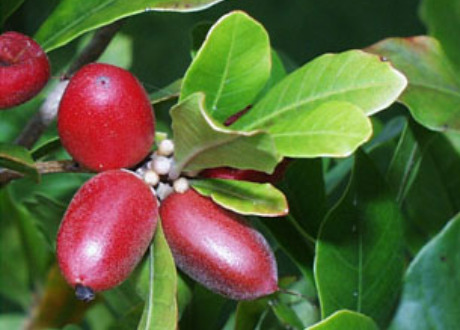Miracle Fruit: Turn Lemons Into Lemonade
Posted by Eagranie Yuh on Sunday, November 15th, 2009
“Hey, do you want to take a flavour trip?”
What started as a pretty normal Sunday afternoon quickly became a mind-bending taste excursion featuring the much-touted miracle fruit. The science of it isn’t fully understood, but researchers think that active compounds in the fruit bind to your taste buds and alter the way that you perceive sour food. Rather than sour, you taste sweet. The miracle fruit is often cited as a way to make healthy foods taste good to a population whose taste buds have been conditioned to crave sugar.
I’m less interested in reaching out to people with maladjusted tastebuds, and more interested in science experiments. Which, in this case, meant raiding the fridge and finding as many sour things as possible.
For some semblance of controlled data, I checked my taste buds before eating the miracle fruit. Lemon? Sour. Lime? Tangy, reminiscent of gin and tonics past. Mandarin orange? Slightly sweet, vaguely tangy, slight honey notes.
The fruit itself is pretty non-descript. It’s pink, with a thin skin and a slightly gelatinous pulp surrounding a hard pit. It tastes sweet and tangy, though I wonder if even the taste of the fruit is altered by its taste-changing properties.
A minute after eating the fruit, I took a nervous taste test. Lemon? Egads! It tasted like a vehicle for pure, unadulterated sugar. Kind of like ordering a lemon drop martini, ignoring the vodka and lemon juice, and licking all of the sugar off the rim. Times ten. In fact, it was too sweet for me – it made my stomach do fluttery little flips like something weird was going on. Which, well, was a pretty accurate reading.
The lime was less sweet than the lemon, though still a mess of syrupy sugary sensation that slid down the back of my throat. The mandarin orange still tasted like a mandarin, but with an enhanced honey finish.
From there, it degenerated into raiding the fridge for anything and everything. Lemon juice? Like sugar water. Dijon mustard? Like honey dijon. Balsamic vinegar? Like a balsamic reduction, super sweet and syrupy. White vinegar? Like a mellower version of itself, almost like rice wine vinegar. Worcestershire sauce? Still spicy, though slightly sweeter than normal.
Mango chutney tasted surprisingly like spicy ketchup. Which, really, is not surprising when you consider that ketchup is a vehicle for sugar.
And teeny tiny grape tomatoes plucked off the remaining vines from the summer gone by? Like teeny tiny pockets of honeyed syrup, exploding in my mouth and finishing with the savoury umami-ness of tomatoes.
Things that it didn’t have an effect on: tahini and peanut sauce. They both tasted normal, because there isn’t much acid in them. Therefore, there was no change in their perceived taste.
The only downside? My sweetness receptors are completely exhausted. No chocolate for me, at least for a few days.
And finally, an observation: the more acid that’s present in a food (for example, lemons and the flavour-bomb grape tomatoes), the more marked the sweetness effect is. It was definitely weird, but not so weird that I wouldn’t try it again. And you’d better believe that the next time, I’ll be armed with an arsenal of sour foods and a bottle of Pepto-Bismol.


Posted on November 15th, 2009
Jonathan says:
Yeah, but what is the fruit called? Is it available somewhere?
Posted on November 15th, 2009
Eagranie Yuh says:
Its Latin name is Synsepalum dulcificum but that probably doesn’t help. They’re pretty easy to find in Asia, but I have no idea where to get them in Canada. I was told that I could try it so long as I didn’t ask too many questions about where it came from. :)
Posted on November 16th, 2009
Jer says:
Great post, Eagranie – I like this quote from Wired article about researchers who bioengineered lettuce to produce miraculin (the active ingredient in the berries):
“We used the miraculin tablets, then started trying every sour thing we could find. I remember straight lemon juice as being pretty good. I also tried vinegar and sauerkraut juice. […] The next morning we awakened with ulcers in our mouths, barely able to talk. Sure, these things tasted sweet, but they were still highly acidic.”
Posted on November 16th, 2009
Eagranie says:
Jer, thanks for sharing. I hope someone comes up with a nicer name than miraculin, which just sounds weird to me.
And yes, I think you’d have to be very careful to taste, rather than eat, things. I thought I did a good job of just tasting, and while my mouth was okay, my stomach definitely protested.
Posted on November 16th, 2009
Kerry Speiser says:
Jonathon – our psych group just had a fundraiser last week at MacEwan U in Alberta. If you buy them online at http://www.miraclefruitfrundraisers.com your purchase will go towards our club. I dont know how long our online fundraiser will be there though. It was a sweet experiment – highly recommend checking these things out.
Posted on May 31st, 2010
Janet Peltier says:
Superfood… miracle fruit, I like it but its hard to grow (have my own tree)